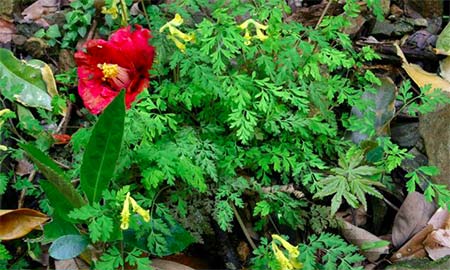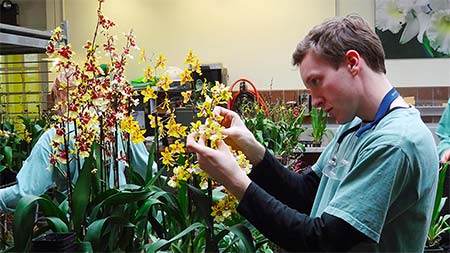After the completion of M.Sc Botany, the students have abundant career opportunities in many areas that are related to plant and plant techniques. There are a good number of careers available after M.Sc Botany. Some of the important roles available after M.Sc Botany are listed below:
Agricultural Consultant
The agricultural consultant gives specialist advice to agricultural and farming businesses to help them with technical, financial and commercial matters. They are also responsible to guide the clients to follow scientific cropping techniques that increase the yields.
Role of an Agricultural Consultant
As an Agricultural consultant one will be responsible to work and ensure that the client’s business or enterprises are running as efficiently as possible. The agricultural consultant will be aware of the business and legislative implications of the advice given. The agricultural consultant is required to perform a thorough survey of the fields and advise the clients about the crops that can be grown on that particular area.
Responsibilities of an Agricultural Consultant
As an agricultural consultant one is responsible to:
- Visit clients to identify and evaluate their business and technical requirements
- Assist the clients with business planning, planning applications, government grant applications, legislative advice and new business ventures
- Collect and analyse data crop yield and financial reports to measure performance
- Prepare or modify business or operating plans for agriculture plantations
- Organise and conduct field trials of new crops
- Plan and implement improvements for the client such as using more effective and pest control measures or finding more efficient ways to keep livestock
- Organise presentations for professional bodies and other interested groups
- Write advisory leaflets technical notes and possibly press releases and articles
- Market and promote consultancy services to new customers while maintaining existing client relationships
- Research and keep up to date with any relevant developments in agriculture
Plant Breeder/ Geneticist
Plant breeders work on improving the quality and performance of existing agricultural and horticultural crops and create new varieties of plants. They are required to carry out research and come up with new traits of plants and seeds.
Role of a Plant Breeder/Geneticist
As a Plant breeder/Geneticist, one is responsible to develop useful traits in plants, such as disease resistance and drought tolerance. As a Plant Breeder/Geneticist one is responsible to improve characteristics of the plants such as appearance, size, structure, etc.
Responsibilities of a Plant Breeder/Geneticist
As a Plant Breeder/Geneticist one is needed to:
- Produce research aims and objectives and predict the cost of the work
- Research methods and techniques for improving plant breeding
- Identify and select plants exhibiting desirable traits, based on natural genetic variation
- Cross plants to produce new breeding material for field and glasshouse trials
- Analyse and scientifically assess plant breeding in laboratory and field trials and select the best varieties
- Multiply up and produce virus free plants
- Maintain detailed records throughout the research and development cycle
- Monitor the activities of the competitors and work towards producing efficient plant breeding technologies to counter them
- Respond to enquiries from farmers, agronomists and other professionals
- Keep up to date in the fast-moving area of science and translate ideas from scientific literature into new approaches to breeding problems
Farm Manager
The Farm Managers ensure the smooth running of a farm or estate by overseeing operations and making sound business decisions. The farm managers are responsible to maintain an agricultural land and strive to provide better yields.
Role of a Farm Manager
As a farm manager one will usually work with crop cultivation and ensure that proper yields are obtained. The farm managers are responsible to maintain the balance between the livestock and crops. They are also required to implement new and innovative techniques for increasing yields.
Responsibilities of a Farm Manager
As a Farm Manager one is needed to:
- Plan finances and production to maintain form progress against budget parameters
- Market the farm products to better price
- Buy supplies such as fertilisers, insecticides, pesticides and seeds for harvesting
- Maintain and monitor the quality of yield, whether livestock or crops
- Make sure products are ready for deadlines such as auctions and markets
- Ensure that farm activities comply with government regulations
- Apply health and safety standards across the farm estate
- Maintain knowledge of pests and diseases and an understanding of how they spread and how to treat them
Amenity Horticulturist
As an Amenity horticulturist one is responsible to design leisure areas by growing plants in specific manner and design such as botanical gardens, flower gardens, etc. They are required to choose the types of plants to be grown according to the climatic conditions of the specific area.
Role of an Amenity Horticulturist
As an Amenity Horticulturist one is responsible to design, construct, manage and maintain living recreational and leisure areas like:
- Botanic and public gardens
- Cemeteries and crematoria
- Country parts
- Historic gardens and landscapes
- Sports facilities
- Urban tree planning
- Tea gardening
As an Amenity Horticulturist one is responsible to manage the area with technological competence by having a scientific understanding of traditional skills of cultivation.
Responsibilities of an Amenity Horticulturist
As a responsible amenity horticulturist, one is needed to:
- Take the lead role in planning, preparation and maintenance of gardens, grounds and other leisure areas
- Supervise and assist in all stages of cultivation and maintenance
- Design and plan planting schemes for new projects and review existing planting schemes
- Prepare, implement and monitor weekly, monthly and annual maintenance programmes
- Analyse the horticultural operational costs
- Manage pest, disease and weed control programmes against health and hygiene standards, ensure a prompt response and the maintenance of service contracts
- Meet the increasing requirements of organic cultivation
- Assist in the development of the wildlife in gardens and grounds
- Conduct environmental assessments
- Consider proposed changes to existing public amenities and leisure locations and assess their potential benefits
- Acquire knowledge of regulations, including pesticides, chainsaws and use of machinery of personal protective equipment and control of substances
- Formulate solutions and plan and organise trials of plants to assess their effectiveness
- Prepare new or modified operational and business plans
- Organise presentations, technical visits and demonstrations
- Advise and plan tree planting succession planting and maintenance programmes and arrange for surveys and tree surgery to be carried out
Salary and Emoluments
The M.Sc Botany students will earn a salary of around 6 lakhs to 10 lakhs per annum. The salary varies according to the recruiter and location.
Final Lines
Although there are a number of jobs available for M.Sc Botany students, the above mentioned are some of the important ones. The M.Sc Botany students will be hired in organisations that are related to plant and plant substances. The skilled botanists are hired in the research field, pharmacy companies, agriculture produce companies, fertiliser factories, cosmetic production units and many more. The plants form as the key ingredients for many products and M.Sc Botany students are required in all such areas.
The students who are passionate about the plants can join the M.Sc Botany course. They can find lucrative career opportunities that offer them good salaries and also excellent career growth prospects.





